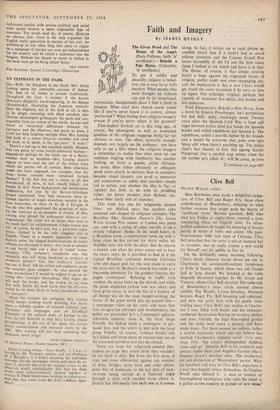Clive. Bell
NI:VILE WALLIS writes:
Max Beerbohm once made a delightful carica- ture of Clive Bell and Roger Fry, those close confederates of Bloomsbury, debating to what further excesses they might push the theory of 'significant form.' Beyond question, Bell, who died last Friday at eighty-three, exerted a most stimulating tOrce on English taste. To often- baffled audiences he taught his meaning of beauty purely in terms of form and colour. His post- impressionist bible laid open at Cdzanne, Clive Bell preached that the artist is not an imitator but an inventor; that he really creates a new world for himself and his public to live in.
On the brilliantly sunny morning following Clive's death, Duncan Grant drove me out to Charleston, his seventeenth-century farmhouse at Firle in Sussex, which these two old friends had so long shared. We lunched at the table elegantly decorated together by Mr. Grant and Vanessa, whom Clive Bell married. The table-talk of Bloomsbury's inner circle seemed almost audible. The Woolfs, Lytton Strachey, Maynard Keynes, Roger Fry, Bell booming and rubicund, and here my artist host with his gentle voice trailing away. Clive Bell's two studies at Charles- ton I saw, filled with books and his intimates' exuberant decorations flowing on to every surface and door. Outside, the high flint-walled garden and the rushy pool make a picture, and have made many. Yet there seemed no sadness, rather a zestful continuity which one can believe has marked Charleston's singular savoir vivre ever since 1916. The critic's distinguished children come and go : Quentin Bell to his sculpture and pottery studio there, and Angelica Garnett who is Duncan Grant's loveliest sitter. The intellectual wit and distinction of 'Bloomsbury' persist. What his familiars will miss in Clive Bell's departure is a trait they happily evince themselves. As Virginia Woolf once defined it: 'a man or woman of thoroughbred intelligence who rides his mind at a gallop across country in pursuit of new ideas.'




























 Previous page
Previous page